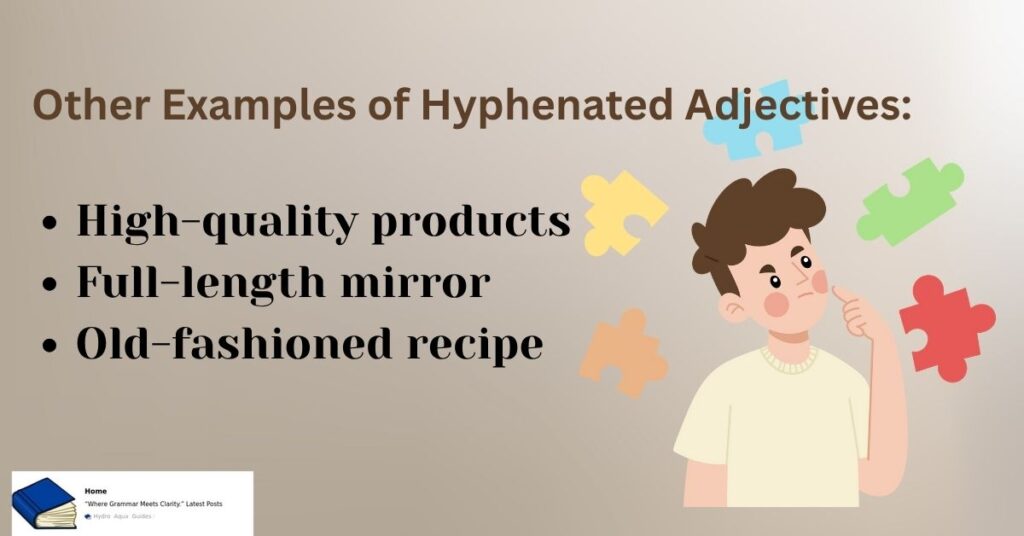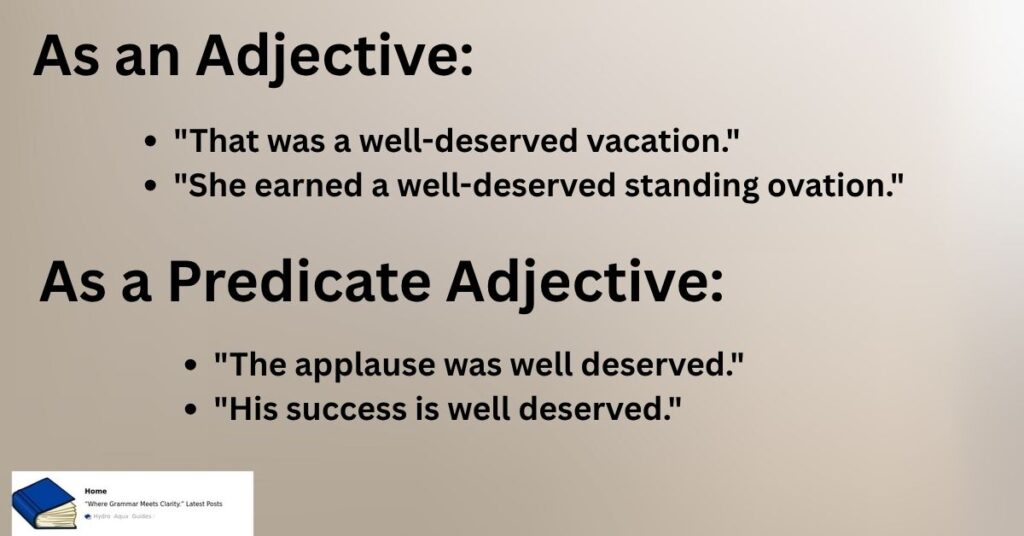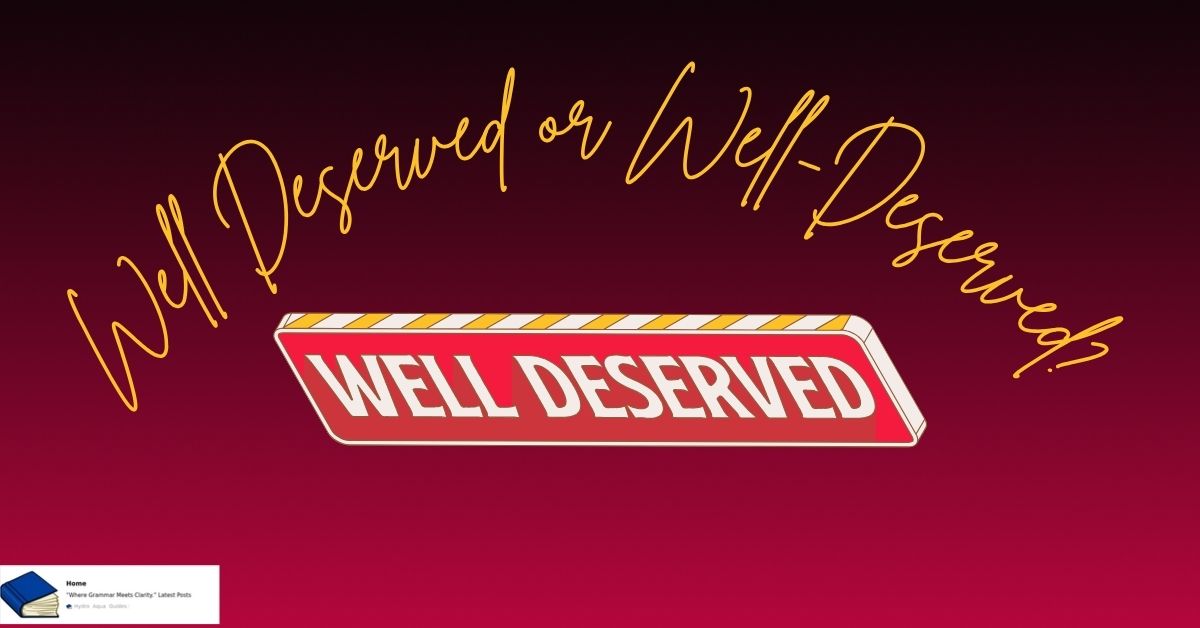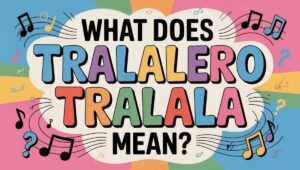Few expressions carry the warm weight of praise quite like “well deserved.” It’s a phrase we use to recognize effort, appreciate excellence, and commend achievement. But when it comes time to write it, a common question bubbles up: Is it “well deserved” or “well-deserved”? Let’s dig into the well deserved meaning, its grammar rules, and how to confidently use it in any context.
What Does “Well Deserved” Actually Mean?
At its core, “well deserved” means something has been rightly earned or truly merited. Whether it’s an award, a break, or applause when someone has worked hard or shown exceptional performance, the recognition they receive is “well deserved.”
Examples of “Well Deserved” in Everyday Life:
- After three years of tireless study, Monica’s promotion was well deserved.
- The team celebrated their well-deserved victory after months of intense training.
In both cases, the praise is a direct result of effort, talent, or persistence. That’s what gives this phrase its emotional punch.
Is “Well Deserved” Hyphenated?
Here’s the million-dollar question: Is well deserved hyphenated?
The Short Answer:
Yes but only sometimes.
The Rule of Thumb:
When “well deserved” is used before a noun as an adjective, it must be hyphenated: well-deserved.
When it’s used after the verb or stands alone, there’s no hyphen: well deserved.
Examples:
| Correct Form | Explanation |
|---|---|
| She received a well-deserved award. | Hyphenated because it’s an adjective before a noun. |
| Her success was well deserved. | No hyphen because it follows the verb. |
| That was well deserved! | No hyphen since it’s used independently. |
So, the hyphen is all about placement.
Why Do We Hyphenate Adjectives Like “Well-Deserved”?
In English, compound adjectives (two or more words working together to describe a noun) are typically hyphenated when they come before the noun they modify. This helps avoid confusion and improves readability.

The same applies to well-deserved. It’s a hyphenated adjective when used before a noun, helping the reader understand that the praise, reward, or recognition is not just deserved but deserved well.
The Confusion: “Much Deserved” or “Well Deserved”?
Both phrases exist, but they’re not interchangeable.
- Well deserved = earned through merit or hard work.
- Much deserved = implies a high degree of deserving, but it’s less common and can sound awkward in formal contexts.
Use Case Examples:
- Well deserved: “After years of volunteer work, Clara finally received the well-deserved award.”
- Much deserved: “It was a much deserved break after a 14-hour shift.” (Less standard than “well-deserved break”)
If in doubt, stick to well deserved. It’s the idiomatic and widely accepted choice.
“Well Deserved” in Professional and Academic Settings
In formal writing especially in resumes, recommendation letters, or awards speeches the phrase “well deserved” carries professional weight.
Examples:
- “His promotion to senior analyst was well deserved given his consistent contributions.”
- “Please join me in congratulating Maria on this well-deserved recognition.“
Whether it’s a scholarship, a title, or an honor, describing it as well deserved communicates both approval and respect.
Noun, Adjective, or Verb? Breaking Down Usage

Not Used as a Noun or Verb:
The phrase “well deserved” or “well-deserved” doesn’t function as a standalone noun or verb. It always modifies something else or works as part of a sentence to describe a state or outcome.
Regional Differences: US vs UK English
Good news there’s no major difference in the hyphenation rule between US and UK English when it comes to “well deserved.” In both forms, hyphenate when the phrase is used before a noun, and leave it open when it follows a verb.
However, in British English, you might see slightly more flexibility in punctuation overall, but the general rule of hyphenating compound modifiers applies universally.
Common Mistakes with “Well Deserved”
Let’s clear up a few frequent errors:
- Wrong: “A well deserved-break”
Problem: Misplaced hyphen.
Fix: “A well-deserved break” - Wrong: “This win was well-deserved.”
Problem: Unnecessary hyphen.
Fix: “This win was well deserved.” - Wrong: “A deserved-well success”
Problem: Word order and meaning error.
Fix: “A well-deserved success”
Why Getting It Right Matters
Using proper grammar, including hyphenation, shows attention to detail. It strengthens your writing, whether you’re:
- Submitting a college essay
- Writing a blog post
- Crafting a professional email
- Posting on LinkedIn
In any context, a well-deserved compliment reads smoother and looks more polished when the grammar is correct.
Variations and Related Expressions
You might hear or read different expressions that carry a similar meaning:
- Rightfully earned
- Justly rewarded
- Truly merited
- Deserved recognition
All of these aim to acknowledge someone’s achievements in a way that highlights effort and merit.
Idiomatic Uses:
- “That trophy is well deserved, no doubt.”
- “After years of work, this raise feels long overdue and well deserved.”
How to Remember When to Hyphenate
Here’s a handy rule:
If it comes before a noun, hyphenate. If it comes after a verb, don’t.
Mnemonic tip: Before the noun? Hyphen down.
| Position | Hyphenation | Example |
| Before noun | Hyphenate | “Well-deserved success” |
| After verb | Don’t hyphenate | “The success was well deserved.” |
Real-Life Scenarios and Names
Let’s add some realism with examples that feel personal:
- Jasper had been overlooked for years. When he was finally awarded Employee of the Month, it was a well-deserved moment of validation.
- Leila’s debut novel earned critical acclaim. Reviewers called it a well-deserved breakout success.
- After months of rehab, Coach Daniels finally ran a marathon. The cheers at the finish line? Entirely well deserved.
These aren’t just grammar lessons they’re snapshots of effort meeting recognition.
Summary Table: Quick Reference
| Usage | Hyphenation | Correct Form | Example |
| Before a noun | Yes | Well-deserved | “A well-deserved vacation” |
| After a verb | No | Well deserved | “The vacation was well deserved” |
| As standalone | No | Well deserved | “Well deserved!” |
Concclusion:
Getting comfortable with phrases like well deserved isn’t just about grammar it’s about clarity, confidence, and style. Knowing when to hyphenate improves your writing’s polish and helps you express praise with precision.
So, next time you type up a shout-out, a thank-you card, or a professional recognition, you’ll know exactly what to do.
Use “well deserved” with purpose. Hyphenate smartly. And let every well-deserved success shine.









